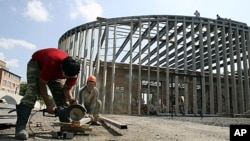September 1 marks the seventh anniversary of the terrorist attack at School Number One in Beslan, a town in North Ossetia, a republic in Russia's North Caucasus region. The massacre that took place there is still having repercussions.
The three-day siege and massacre that started on September 1, 2004, is the bloodiest terrorist act ever in Russia. Marshall Goldman, professor emeritus at Wellesley College and senior scholar at Harvard University's Davis Center for Russian Studies, shared his remembrances of that day with VOA.
"Anything having to do, of course, with schoolchildren is very emotional," said Goldman. "And the seizing of the children at that point, particularly given the fact that there did not seem to be any restraint on the part of the captors, [there was] fear that this could set off a whole chain of fighting and retaliation and turmoil."
The attack began on the first day of the school year, known as the Day of Knowledge. Children and parents go to school together to celebrate the beginning of the new school year and the opportunity to learn new things.
A group of around 30 mostly Chechen and Ingush Islamic militants, allegedly controlled by Chechen separatist leader Shamil Basayev, occupied the school after the opening day assembly. They killed a number of adults before taking more than 1,100 people hostage, including nearly 800 children.
During the 52-hour standoff, most of the hostages were held in the school's gymnasium building, where temperatures soared and no food or water was provided.
On the third day of the standoff, it appeared some progress was being made as aid workers were allowed in to collect the bodies of some of the adults killed in the initial shootout, and several hostages were released.
But suddenly there was a series of powerful explosions, followed by a fire that engulfed the gym and caused its roof to collapse. In response, heavily armed Russian security forces, backed by tanks, stormed the building and fought a pitched battle against the hostage-takers. When it was over, more than 340 hostages, including 186 children, were dead. Hundreds more were wounded, and others were reported missing.
Since the attack in Beslan, insurgent violence in Chechnya has lessened - thanks largely to an iron-fisted counter-insurgency campaign by the republic's pro-Moscow leader, Ramzan Kadyrov.
Still, insurgent violence in Chechnya has by no means become a thing of the past: just on Wednesday, three suicide bombers killed at least nine people, including seven policemen, in Grozny, the Chechen capital. And attacks by Islamist militants targeting police and officials are almost a daily occurrence in other republics of the North Caucasus, particularly Dagestan and Kabardino-Balkaria.
Still, the Beslan attack was unprecedented in terms of the number of its victims, including hundreds of children. Goldman says that the memories of that violence has not faded in the region.
"I think that these memories in the Caucasus [will] endure for a long time," said Goldman. "And you can never be sure when they will reoccur and lead to violence."
Indeed, the future of the North Caucasus remains uncertain. But all Russians hope there will never be another attack like the one that opened Beslan's school year in 2004.
Impact of Beslan Massacre Still Felt 7 Years Later
- By Steve Schy




